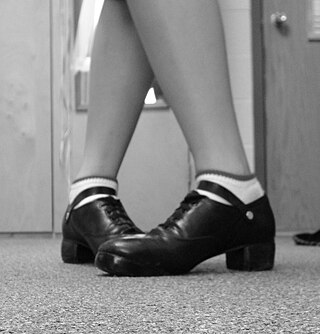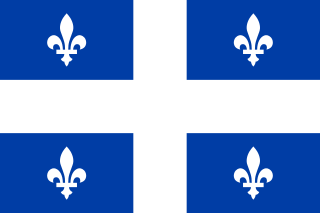
The reel is a folk dance type as well as the accompanying dance tune type. Of Scottish origin, reels are also an important part of the repertoire of the fiddle traditions of Britain, Ireland and North America. In Scottish country dancing, the reel is one of the four traditional dances, the others being the jig, the strathspey and the waltz, and is also the name of a dance figure.

Saint-Jean-Baptiste Day, also known in English as St John the Baptist Day, is a holiday celebrated on June 24 in the Canadian province of Quebec. It was brought to Canada by French settlers celebrating the traditional feast day of the Nativity of Saint John the Baptist. It was declared a public holiday in Quebec in 1925, with publicly financed events organized province-wide by a Comité organisateur de la fête nationale du Québec.

Ford v Quebec (AG), [1988] 2 SCR 712 is a landmark Supreme Court of Canada decision in which the Court struck down part of the Charter of the French Language, commonly known as "Bill 101". This law had prohibited the use of commercial signs written in languages other than French and required businesses to use only the French versions of their names. The court ruled that Bill 101 violated the freedom of expression as guaranteed in the Canadian Charter of Rights and Freedoms.

The Quebec sovereignty movement is a political movement whose objective is to achieve the independence of Quebec from Canada. Sovereignists suggest that the people of Quebec make use of their right to self-determination – a principle that includes the possibility of choosing between integration with a third state, political association with another state or independence – so that Québécois, collectively and by democratic means, give themselves a sovereign state with its own independent constitution.
As a cosmopolitan province, Quebec is a home to varied genres of music, ranging from folk to hip hop. Music has played an important role in Quebecer culture. In the 1920s and '30s, singer/songwriter Madam Bolduc performed comedic songs in a folk style with Irish influences. Quebec's most popular artists of the last century include Félix Leclerc (1950s), Gilles Vigneault (1960s–present), Kate and Anna McGarrigle (1970s–present) and Céline Dion (1980s–present).
This article presents the current language demographics of the Canadian province of Quebec.

Joseph-Aldric Ouimet, was a Canadian parliamentarian.

Kashtin were a Canadian folk rock duo in the 1980s and 1990s, one of the most commercially successful and famous musical groups in First Nations history.
Articles related to Quebec include:
Scots-Quebecers are Quebecers who are of Scottish descent.
Quebec English encompasses the English dialects of the predominantly French-speaking Canadian province of Quebec. There are few distinctive phonological features and very few restricted lexical features common among English-speaking Quebecers. The native English speakers in Quebec generally align to Standard Canadian English, one of the largest and most relatively homogeneous dialects in North America. This standard English accent is common in Montreal, where the vast majority of Quebec's native English speakers live. English-speaking Montrealers have, however, established ethnic groups that retain certain lexical features: Irish, Jewish, Italian, and Greek communities that all speak discernible varieties of English. Isolated fishing villages on the Basse-Côte-Nord of Quebec speak Newfoundland English, and many Gaspesian English-speakers use Maritime English. Francophone speakers of Quebec also have their own second-language English that incorporates French accent features, vocabulary, etc. Finally, the Kahnawake Mohawks of south shore Montreal and the Cree and Inuit of Northern Quebec speak English with their own distinctive accents, usage, and expressions from their indigenous languages.
Anti-Quebec sentiment is a form of prejudice which is expressed toward the government, culture, and/or the francophone people of Quebec. This prejudice must be distinguished from legitimate criticism of Quebec society or the Government of Quebec, though the question of what qualifies as legitimate criticism and mere prejudice is itself controversial. Some critics argue that allegations of Quebec bashing are sometimes used to deflect legitimate criticism of Quebec society, government, or public policies.
Québécois(e) or Quebecois(e) may refer to:
Music of Canadian Cultures is a wide and diverse accumulation of music from many different individual communities all across Canada. With Canada being vast in size, the country throughout its history has had regional music scenes. The music of Canada has reflected the multi-cultural influences that have shaped the country. First Nations people, the French, the British, the United States and many others nationalities have all made unique contributions to the musical heritage of Canada
Townshippers' Association is a non-partisan, non-profit organization mandated to support the rights of English-speaking people in the historical Eastern Townships region of the Canadian province of Quebec. It is known in French as the Association des Townshippers. The association has its head office in Lennoxville and a branch office in Knowlton.

The following outline is provided as an overview of and topical guide to Quebec:
Quebecers or Quebeckers are people associated with Quebec. The term is most often used in reference to either descendants of the French settlers in Quebec or people of any ethnicity who live and trace their origins in the province of Quebec.
Christopher Skeete is a Canadian politician who was elected to the National Assembly of Quebec in the 2018 provincial election. He represents the electoral district of Sainte-Rose as a member of the Coalition Avenir Québec. On October 18, 2018, he was named parliamentary secretary to the premier François Legault. He was named the Parliamentary Assistant to the Premier for Relations with English-Speaking Quebecers on November 7, 2018. On February 24, 2021, he was appointed Parliamentary Assistant to the Minister Responsible for the Fight Against Racism. Prior to achieving elected office in 2018, Skeete was vice-president for the West-du-Québec region of the Coalition Avenir Québec party.
English-speaking Quebecers, also known as Anglo-Quebecers, English Quebecers, or Anglophone Quebecers or simply Anglos in a Quebec context, are a linguistic minority in the francophone province of Quebec. According to the 2011 Canadian census, 599,225 people in Quebec declare English as a mother tongue. When asked, 834,950 people reported using English the most at home.